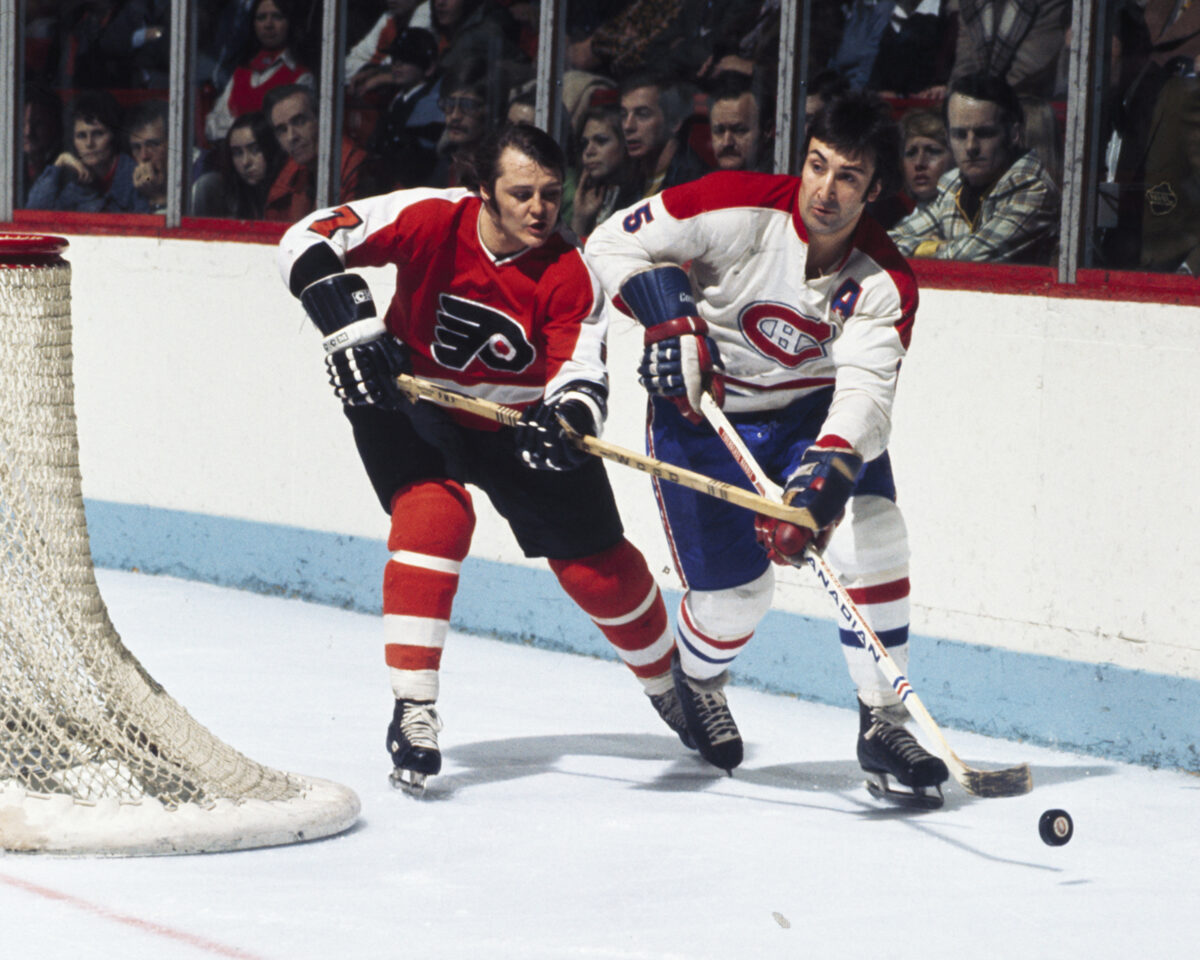Visiting one of the later additions to the Philadelphia Flyers Hall of Fame, Tim Kerr was more than deserving despite a relatively short NHL career. The power-play specialist was one of the best of a generation, but injuries troubled him.

Scoring 363 goals and 650 points in 601 contests as a Flyer, it’s clear that he was among the elite in team history, even if that was largely accomplished in the high-scoring days that were the 1980s. What in particular made the 6-foot-3 winger so special?
Kerr Defies the Odds
Knowing what we know about Kerr now, it’s pretty shocking that he went undrafted. Looking at his junior career, it’s not particularly difficult to see why, though. In his first season of draft eligibility in 1978-79, he had just 17 goals and 42 points in 57 games in the Ontario Hockey League (OHL). Undrafted, the Flyers took a chance on him and signed him as an undrafted free agent.
He did have 40 goals and 73 points in 63 games at 19 and 20 years of age in 1979-80 in the OHL, once again, but that was the best of what he had to offer at the junior level. It’s certainly not poor, but it’s not anywhere close to the top leaderboards, in terms of individual statistics. Regardless, the next season, he was promoted to the NHL to play with the Flyers — it worked like a charm.
Instantly, Kerr was a valuable offensive player. He had 22 goals and 45 points in 68 games in his age-20 rookie campaign with the Orange and Black in 1980-81, which is fairly impressive as the team was coming off a run to the Stanley Cup Final just a season prior. Instantly, able to find a role with the team, and it was only up from there.
From 1981-83, Kerr had 32 goals and 70 points in just 85 games. Unfortunately, he missed almost three-quarters of his 1982-83 campaign, but when he was healthy he was playing at an elite level. Not only was he a solidified NHL player, but he was an immensely important one to a franchise with a storied early history.
Kerr’s Incredible Peak
Kerr truly hit his stride in 1983-84, starting one of the best stints of dominance in Flyers history. He exploded for 54 goals and 93 points in 79 matches, emerging as arguably the best player on the team. While it was an underwhelming postseason for him and the team with just three games and no points under his belt, the undrafted youngster showed he could be one of the best goal scorers in the NHL, not just on the Flyers. Looking at his projection, there was a chance he could rival franchise goal-scoring leader Bill Barber, who dominated the 1970s.

The next season, Kerr one-upped himself with 54 goals and 98 points in 74 contests. Only this time, he had a league-leading 21 power-play goals, helping the Flyers earn a godly 53-20-7 record — the best in the NHL. He and the Flyers went on a run to the Stanley Cup Final that season, only being stopped by the Edmonton Oilers in five games. He was a big part of this, scoring 10 goals and 14 points in 12 contests. He had his first breakout playoff performance, only hindered by injury.
Related: Flyers’ 1984-85 Team Was a Pristine Display of Youth
In 1985-86, Kerr led the league in power-play goals again. Instead of passing the measly bar that is scoring more goals on the man advantage in that specific season, he decided he wanted to hold the all-time record. With 34 tallies on the power play that campaign, no player has matched or passed him since. An NHL record for several decades now, what he’s done is pretty remarkable. He also set his career-high with 58 goals, adding 26 assists to go along with that. His 84 points were much lower than he was used to, but the goals more than helped to offset that. He only had five contests in the postseason, but his six points proved his value once again.
If his 1984-85 campaign wasn’t good enough, Kerr had a very similar season in 1986-87. With 58 goals and 95 points in 75 matches, these totals were almost becoming routine for him. He, once again, had the NHL lead in power-play goals with 26 this time. His excellence helped lead the Flyers to the Stanley Cup Final for the second time in three seasons, this one a rematch with the Oilers. With eight goals and 13 points in 12 playoff contests leading up to it, postseason dominance was simply part of his DNA.
As foreshadowed by some injury trouble in the Final in 1984-85, where he only played three games, the same thing happened in 1986-87. Only this time, the series went to seven, and the Flyers needed all the help they could get. Not competing in as much as a single contest, the Orange and Black were no match for Wayne Gretzky and the Oilers’ dynasty, though they miraculously made it close. After this, Kerr would never reach the same level of sustained success again.
Injuries Catch Up to Kerr
While all good things must come to an end, it’s unfortunate to see how it happened for Kerr. Both his style of play and bad luck with injuries never truly allowed him to be the same great player he once was. This started with an eight-game showing in 1987-88. He had a much more healthy 1988-89 season with 48 goals and 88 points in 69 contests and a career-high 25 playoff points in 19 contests, but he never played more than half a season after that.

Even though he only played 40 games in 1989-90, he had 24 goals and 48 points. Admirably, he completely disregarded his injuries and produced like he wasn’t battling anything. A 27-game 1990-91 campaign was the nail in the coffin for Kerr, though he still had 24 points. After brief stints with the New York and Hartford Whalers with the two worst point-per-game paces of his career, he decided to retire at the age of 33, the right choice, unfortunately.
Still, Kerr stands as the third-highest goal-scorer in Flyers history and seventh in total points. Even though his career wasn’t particularly long, he’s still one of the most accomplished players ever for the Orange and Black. As such, he is a deserving Hall-of-Fame athlete for the team.